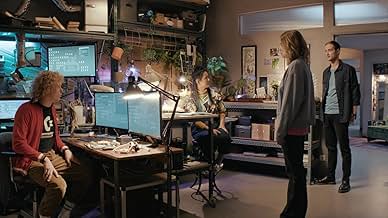IMDb-BEWERTUNG
6,8/10
12.068
IHRE BEWERTUNG
Ein rasanter Thriller nach der Medizinstudentin Mia Akerlund, die in ihrer Universitätsstadt den Einsatz der hoch entwickelten Biohacking-Technologie entdeckt.Ein rasanter Thriller nach der Medizinstudentin Mia Akerlund, die in ihrer Universitätsstadt den Einsatz der hoch entwickelten Biohacking-Technologie entdeckt.Ein rasanter Thriller nach der Medizinstudentin Mia Akerlund, die in ihrer Universitätsstadt den Einsatz der hoch entwickelten Biohacking-Technologie entdeckt.
Folgen durchsuchen
Empfohlene Bewertungen
German series don't usually grab many headlines, with stodgy plots and dead-serious characters, but this is somewhat better: decent plot, well-acted and, once you get past the sci-fi hokum, pretty engaging.
Film editing is sharp and glossy, with high production values and some good use of flash- backs. It touches on some vitally-important issues in bio-ethics, but it's not going to win prizes for insight and originality.
Worth a watch.
Storyline is kinda addictive with really short episodes, it made me watch the next episode as soon as one ends.
Summary
The second season is clearly inferior to the first, since it is more serious, downcast and linear, but it also captures us again by the charisma and fortitude of its protagonist (by Luna Wedler), his conspiracy climate that constantly calls into question the loyalties and behaviors of the characters, some successful suspense scenes, their renewed class notes and what again implies that it takes place in a country with the historical background of Germany.
Review
Contains some information about season 1
The first chapter begins with Mia waking up in a class at the University of Freiburg in a state of confusion: she suffers from an amnesia that prevents her from remembering what happened in the last three months. Her account will describe her attempts to discover the cause of her condition, what is her connection with the event that she had closed the previous season and to reconstruct those three months, while she suffers from some symptoms and signs in principle inexplicable.
The resource of amnesia is always interesting, where those who suffer from it must reconnect with her inner circle and reconstruct her immediate past and assimilate the affective changes that occurred in that period.
Recall that the previous season had ended with Mia betrayed by the journalist Winter and kidnapped in a van with Dr. Lorenz. The young woman does not remember this episode clearly either.
Throughout her investigation and adapting to a changed affective environment, Mia experiences some physical disorders and glimpses of her recent past, the frequency of which makes the use of staging them somewhat repetitive. The situation of Dr. Lorenz, her former nemesis, is also very different.
The comparison with season 1, which was clearly better, is inevitable. Season 2 is more linear, even with all the characters of the previous one it is less choral (his roomates friends are at first almost reduced to a comic relief), it is more serious and does not introduce great conceptual novelties with respect to the first. Mia remains the valued successful experimental subject of the eugenic project Homo Deus, with a highly enhanced immune system. But even the bioethical aspects raised in the previous season lose strength at first, although they reappear at the hands of a powerful character who is revealed as her enemy. Again, the series missed the opportunity to better develop Lorenz's character and her new circumstances.
In any case, the series captures us by the charisma and integrity of its protagonist (by Luna Wedler), its conspiracy climate that constantly calls into question the loyalties and behaviors of the characters, some successful suspense scenes, their renewed notes class and what it implies that it takes place in a country with the historical background of Germany.
The second season is clearly inferior to the first, since it is more serious, downcast and linear, but it also captures us again by the charisma and fortitude of its protagonist (by Luna Wedler), his conspiracy climate that constantly calls into question the loyalties and behaviors of the characters, some successful suspense scenes, their renewed class notes and what again implies that it takes place in a country with the historical background of Germany.
Review
Contains some information about season 1
The first chapter begins with Mia waking up in a class at the University of Freiburg in a state of confusion: she suffers from an amnesia that prevents her from remembering what happened in the last three months. Her account will describe her attempts to discover the cause of her condition, what is her connection with the event that she had closed the previous season and to reconstruct those three months, while she suffers from some symptoms and signs in principle inexplicable.
The resource of amnesia is always interesting, where those who suffer from it must reconnect with her inner circle and reconstruct her immediate past and assimilate the affective changes that occurred in that period.
Recall that the previous season had ended with Mia betrayed by the journalist Winter and kidnapped in a van with Dr. Lorenz. The young woman does not remember this episode clearly either.
Throughout her investigation and adapting to a changed affective environment, Mia experiences some physical disorders and glimpses of her recent past, the frequency of which makes the use of staging them somewhat repetitive. The situation of Dr. Lorenz, her former nemesis, is also very different.
The comparison with season 1, which was clearly better, is inevitable. Season 2 is more linear, even with all the characters of the previous one it is less choral (his roomates friends are at first almost reduced to a comic relief), it is more serious and does not introduce great conceptual novelties with respect to the first. Mia remains the valued successful experimental subject of the eugenic project Homo Deus, with a highly enhanced immune system. But even the bioethical aspects raised in the previous season lose strength at first, although they reappear at the hands of a powerful character who is revealed as her enemy. Again, the series missed the opportunity to better develop Lorenz's character and her new circumstances.
In any case, the series captures us by the charisma and integrity of its protagonist (by Luna Wedler), its conspiracy climate that constantly calls into question the loyalties and behaviors of the characters, some successful suspense scenes, their renewed notes class and what it implies that it takes place in a country with the historical background of Germany.
It was very entertaining to watch. Yes it is fast paced, yes it's not the best writing ever, a little cliche buuut entertaining. I think overall was good
I was shocked by some of the bad reviews in here, not at all accurate . With the complete lack of anything to watch in covid times I found this really entertaining and enjoyable. Even if there was lots to choose from I would still watch this any day. I do not consider myself an expert critic like many of the people commenting obviously do , just a good show.
Wusstest du schon
- WissenswertesEpisodes have a total running time of between 40 - 46 minutes, but the end credits run between 9 -10 minutes thus making actual plot times around 30-36 minutes.
Top-Auswahl
Melde dich zum Bewerten an und greife auf die Watchlist für personalisierte Empfehlungen zu.
- How many seasons does Biohackers have?Powered by Alexa
Details
- Erscheinungsdatum
- Herkunftsland
- Sprache
- Auch bekannt als
- قراصنة الأجساد
- Drehorte
- Freiburg im Breisgau, Baden-Württemberg, Deutschland(Most of the university scenes are actually filmed at the real University of Freiburg.)
- Produktionsfirma
- Weitere beteiligte Unternehmen bei IMDbPro anzeigen
- Laufzeit44 Minuten
- Farbe
- Sound-Mix
- Seitenverhältnis
- 2.00 : 1
Zu dieser Seite beitragen
Bearbeitung vorschlagen oder fehlenden Inhalt hinzufügen
































